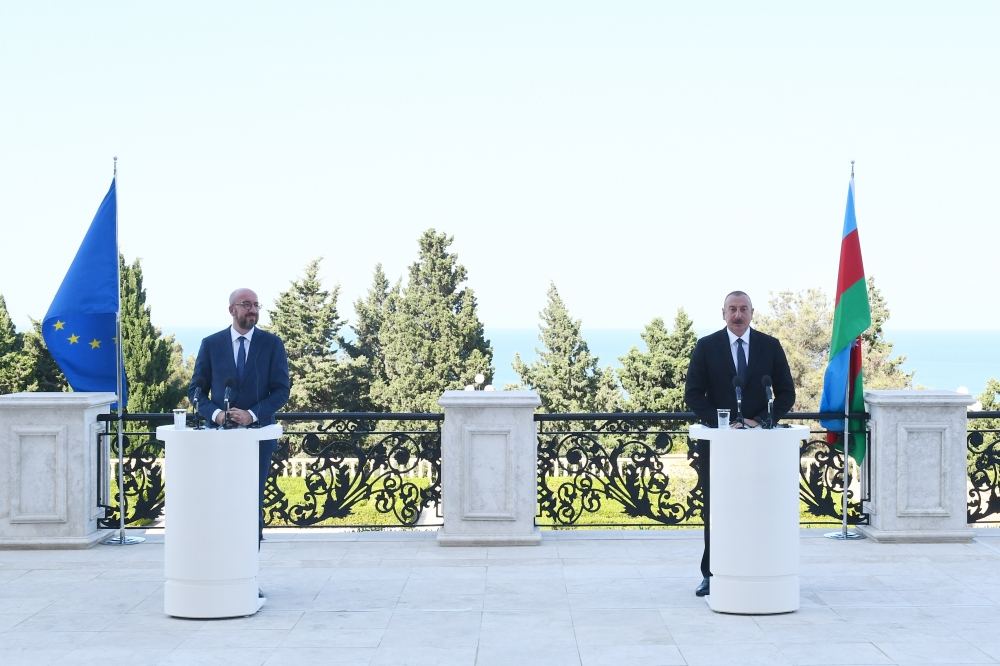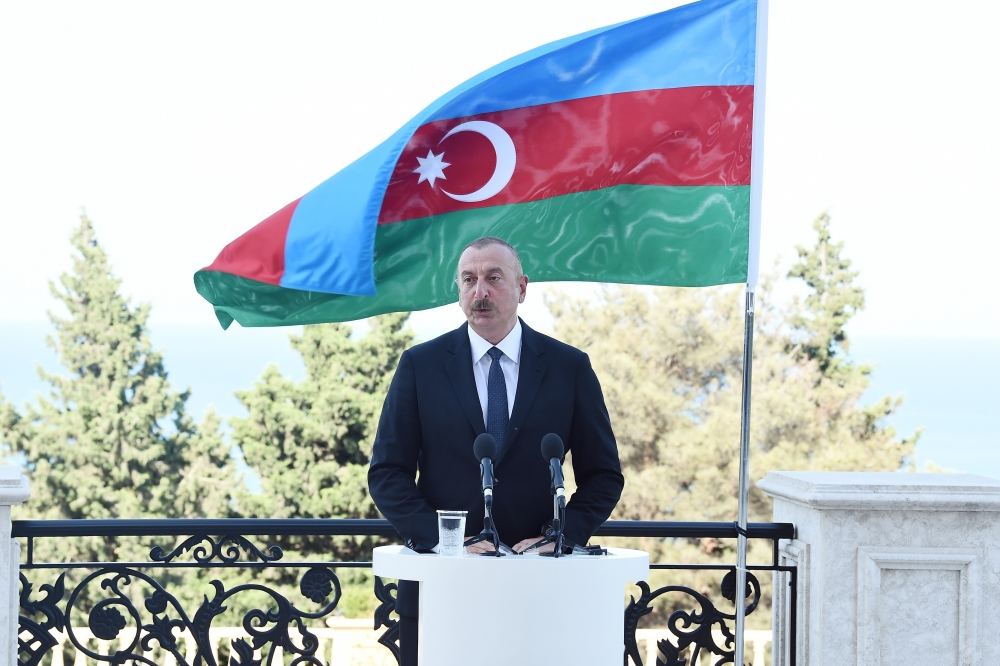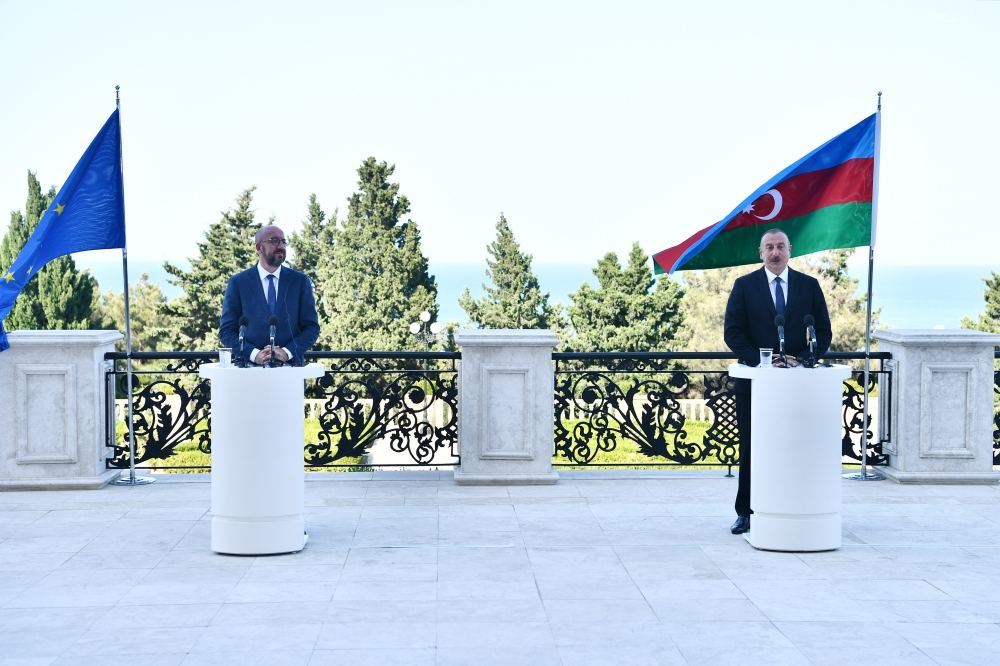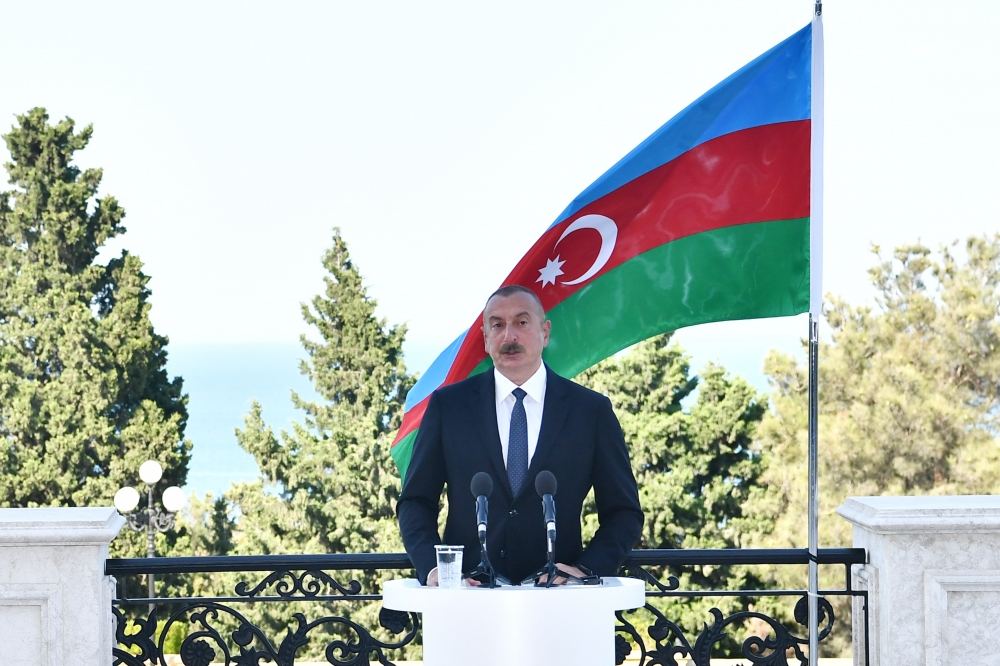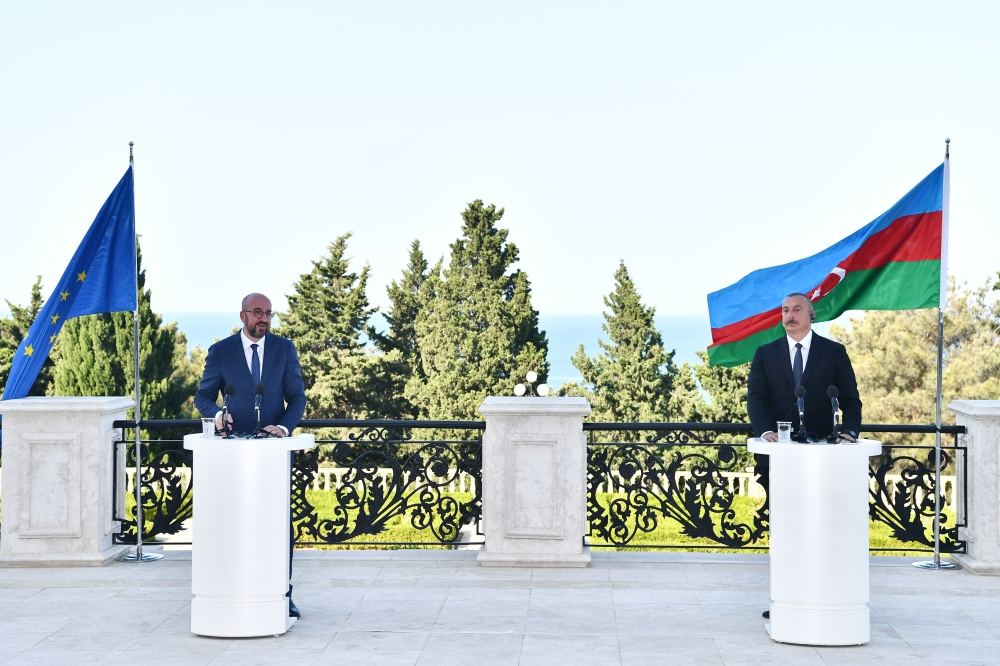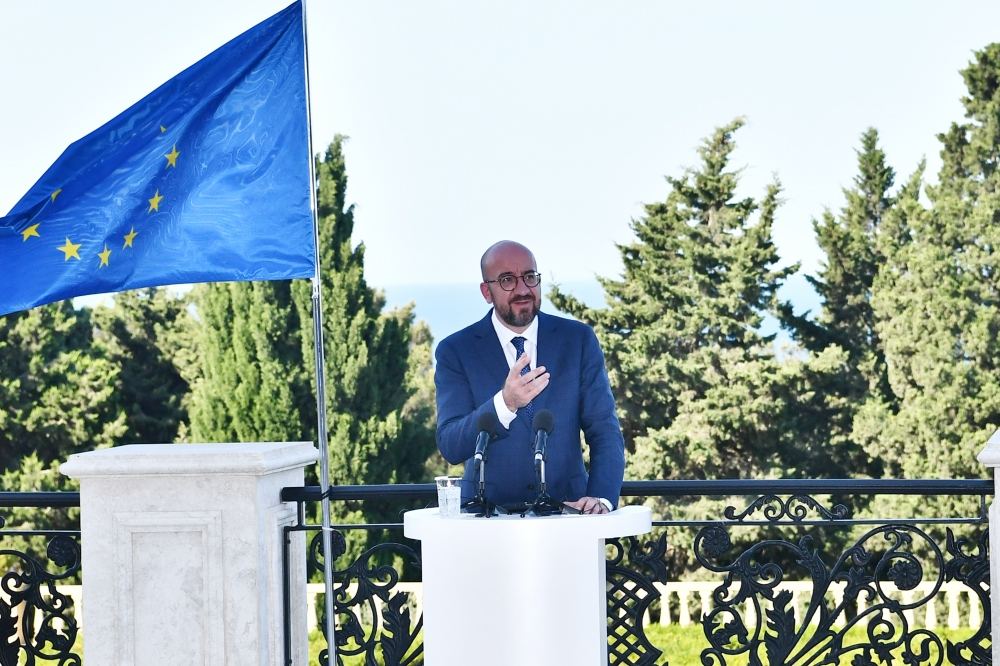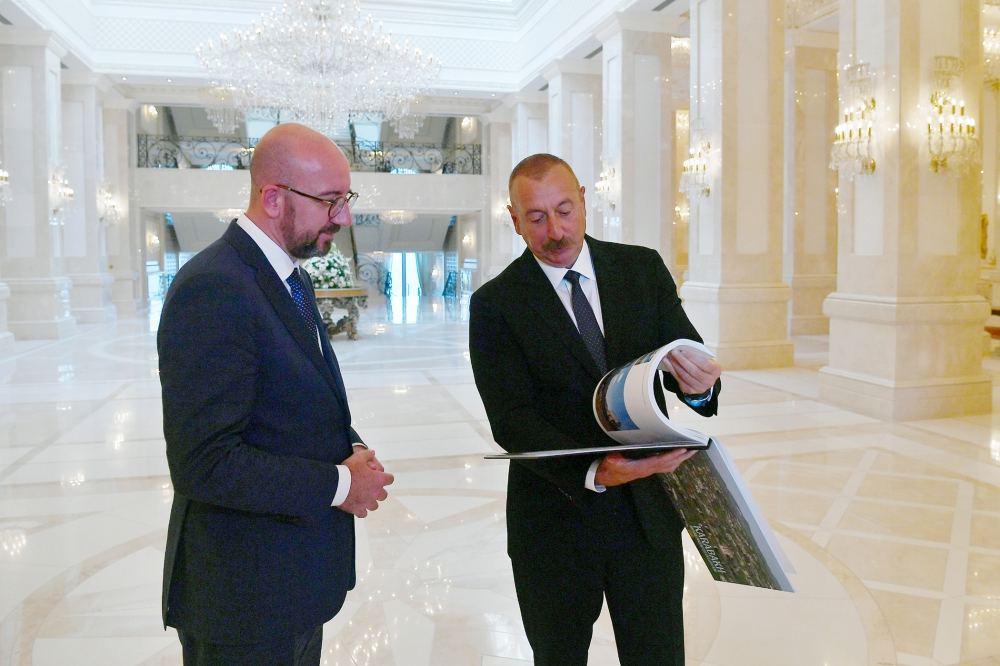BAKU, Azerbaijan, July 18
Trend:
Following the expanded meeting, President of the Republic of Azerbaijan Ilham Aliyev and President of the European Council Charles Michel have held a joint press conference.
President of Azerbaijan Ilham Aliyev and President of the European Council Charles Michel first made press statements.
Statement by President Ilham Aliyev
-Dear Mr. President!
Dear guests, ladies and gentlemen!
I am very glad to host today President Charles Michel. We had very productive and long discussions about our cooperation, our plans and our achievements. I think the visit of President Michel to Azerbaijan is a good indication of our partnership.
For us, the European Union is a close partner. We have been working in different areas for many years. The agenda is very broad. A strong political context which we have, of course, creates a very good foundation for diversification of our cooperation.
The European Union is our main trading partner. Almost 40 percent of our trade is a trade with the European Union. Last year’s trade turnover was almost $9.5 billion. $6.8 billion dollars is Azerbaijani export to EU member states. More than 1,700 companies from member states work in Azerbaijan. This also demonstrates the scope of our economic activity.
We are very active in bilateral ties with the member states. With 9 member states of EU, Azerbaijan signed or adopted documents on strategic partnership. So one-third of EU member states consider Azerbaijan as a strategic partner. I think this is a very big achievement of our government. This also creates additional opportunities for cooperation. Important part on our agenda, of course, is related to energy security. Here, we can only report about great achievements, I would say historical achievements, especially the completion of the Southern Gas Corridor project. The last day of the last year is a really event of the historical importance. The Trans Adriatic Pipeline which was the last-fourth segment of the Southern Gas Corridor is already in operation. Since January 1 until today, already more than 3 billion cubic meters of natural gas was exported from Azerbaijan to EU member states, particularly to Italy, Greece and Bulgaria. Of course, the volume of natural gas to be exported to European Union market will grow. Also, I would like to add that the Southern Gas Corridor is a project of energy security and with EU we, for many years, are chairing the Southern Gas Corridor Advisory Council and under the leadership of EU and Azerbaijan Advisory Council became also important factor of successful implementation of this project. 3,500 km length integrated pipeline system and huge Shah Deniz 2 gas field’s development, really is a unique experience of cooperation between countries, companies and international financial institutions. The total investments in the South Gas Corridor project were more than $33 billion. At the same time, for many years already, for 15 years Azerbaijan is a reliable crude oil supplier to European consumers. And now, as a gas supplier our potential, of course, will grow and this will create more opportunities for us as an exporter, for transiters and for consumers, because gas from Azerbaijan is not only gas from the new route but is a gas from the new source. This makes this project really the project of energy security.
We discussed with Mr. President today the issues related to connectivity. In general this issue was always on the agenda between EU and Azerbaijan, especially after completion of the huge transportation infrastructure projects. After the second Karabakh war there are new opportunities for opening of all communications in the region as it was provided by the trilateral agreement of November 10, last year. So, this issue was broadly discussed today, as well as other issues of post-conflict development in the region, because this created a new situation, this created new realities. Azerbaijan put an end to a long-lasting Armenian occupation of our territories. Azerbaijan itself implemented resolutions of the UN Security Council, demanding unconditional and full withdrawal of Armenian troops from our territories, and Azerbaijan has put an end to war. Therefore, now it is time to think about peace and to turn the page. We are ready for that. Today, with Mr. President we broadly discussed our plans, our initiatives and our approaches to the newly emerged situation. I think that demonstrating good will and very pragmatic approach in a relatively short period of time, we can resolve most of the still remaining issues on the table and lay down the foundation for a broad regional cooperation in the region.
EU plays, and I am sure will play very important role from this point of view and the visit of Mr. President to the three countries of the South Caucasus demonstrates European involvement, European agenda. It is fully in line with our agenda. Our views coincide with this issue also. Of course, the post-conflict development with respect to connectivity issues, with respect to issues of reconstruction of the liberated territories will be always on our agenda. Mr. President, once again, I would like to express gratitude for your visit and express assurance that our strong partnership and cooperation will successfully continue. Thank you.
Statement by President of the European Council Charles Michel
- Thank you very much, Mr. President.
In turn, I would like to thank you for your hospitality and for the opportunity to meet with you. As you mentioned, an extensive and in-depth exchange of views on the nature of relations between the European Union and Azerbaijan is the first issue we discussed. Because we want to give another impetus to our relations. We actually want to give the partnership between the European Union and Azerbaijan a strategic nature. This morning, I got acquainted with future-oriented projects in Azerbaijan in the fields of innovation, satellites, as well as infrastructure. I was familiarized with the work on creating new opportunities in the port of Baku, as well as the regional scale. We understand that the partnership between the European Union and Azerbaijan is not based on financial support. On the contrary, it is a partnership based on the desire to work together, on innovation, technological exchanges and economic cooperation. It is in this spirit that the two priorities the European Union considers in terms of economic development – climate change and digital revolution – must be at the heart of the projects we are launching together.
The second topic is the preparation for the EU Eastern Partnership Summit in December. It is important for us to exchange views in order to set expectations. Both sides are preparing for the summit.
You rightly noted that my visit to many Eastern Partnership countries is a sign. It is a sign of the work the European Union is doing in the region. It is a message. This is due to our commitment to security, stability and prosperity in the region, to mobilizing the capabilities and resources of the European Union as a result of dialogue with partners and knowledge of different expectations of Eastern Partnership partners.
The third issue, as you mentioned, is the situation related to Azerbaijan and Armenia. In fact, I would like to thank you that even before this visit, a few weeks ago, we had several telephone conversations to exchange views on the analysis of the regional situation. I would like to thank you for your commitments. Those were the first steps taken. On the one hand, there is the issue of the availability of mine maps and, on the other hand, there is the issue of prisoners, which is considered an important one. At the first stage, this was resolved. We do hope that other stages related to this issue will take place in the near future. At the same time, we had the opportunity to discuss the outstanding issues in great detail in order to achieve certain solutions and these options should be sustainable. I told you that the European Union is ready to support efforts to make progress on various issues. For example, it is a question of delimitation of borders, and for this we are ready to provide European expert assistance and, if necessary and desired, European monitoring. As for the delimitation of borders, there is also the issue of the armed forces located close to the disputed areas. I think this topic should also be discussed.
The third topic – you mentioned it in particular and we are returning to that topic. This is the importance of regional cooperation in various fields. You mentioned the importance of the energy sector in the whole region and even beyond its borders. Infrastructure is important. This is especially true for transportation and various routes. We have also discussed this issue. The European Union also wants to participate in and encourage regional cooperation efforts. We want to convey this message to all parties and countries that are ready to mobilize resources on this issue. I will be in Georgia tonight and tomorrow. This topic will also be on the agenda of our work and plans in Georgia. We believe that peace, lasting peace is about good agreements and their implementation. There are other issues that will sooner or later be discussed in order to make lasting peace a reality for the sake of prosperity, stability and security.
Finally, we have examined a number of issues related to the broader geopolitical situation. We noted some of Azerbaijan's efforts in a number of areas, especially in the field of secularism. There are many debates on this issue in the world.
Mr. President, thank you again for this exchange of views. EU values are a political project that supports democracy, human rights and freedoms. However, the project also seeks to develop strong partnerships with a number of partners to achieve implement of mutual interest.
Thank you for the opportunity to deepen the relations between your country and the European Union.
X X X
Then the presidents answered questions from the media.
Public Television correspondent: My question is to Mr. Charles Michel. After the victory in the second Karabakh war, the Azerbaijani government openly stated its readiness to start negotiations with Armenia on a peace agreement and on the delimitation of borders between the two countries. Unfortunately, Armenia has rejected this proposal. This means that Armenia does not want peace. My question is whether you have discussed this issue with the Armenian government and what the European Union can do to persuade Armenia to start negotiations on a peace agreement? Thank you.
Charles Michel: I did have a detailed discussion with the Armenian government, with the Armenian Prime Minister about the situation and the importance of working to make progress in a possible peace agreement. I had such an opportunity and we had very concrete and clear discussions. We talked about what elements we should take into account to ensure more stability and security in the region.
I also had the opportunity to deliver messages to the President of Azerbaijan. I told both the President of Azerbaijan and the Prime Minister of Armenia that the European Union was ready to play as positive and constructive a role as possible. Of course, we respect the role played by the Minsk Group. However, this does not mean that it is impossible for the European Union to provide certain expert knowledge, support and ideas, and to support certain possible progress to ensure greater stability, security and lasting peace in the region.
Day.az news agency correspondent: My question is to President of Azerbaijan Ilham Aliyev. Your Excellency, after the second Karabakh war you spoke about the opportunities for extensive international cooperation in the field of transport. Azerbaijan has created a modern transport infrastructure. What role can these projects and the projects Azerbaijan is implementing in the liberated territories play in strengthening regional stability and security? Thank you.
President Ilham Aliyev: The opening of all communications is an important issue in the post-conflict settlement, and this is reflected in the trilateral statement signed by the President of Russia, the Prime Minister of Armenia and myself on 10 November last year. The existing modern infrastructure and transport will allow Azerbaijan the opportunity to implement projects in our territories in a relatively short time because we already have a diversified transport network today. Azerbaijan is a landlocked country. Nevertheless, we have managed to create one of the most important transport and logistical hubs in Eurasia. Together with our neighbors, we have completed the construction of the Baku-Tbilisi-Kars railway, which was opened in 2017 and made a significant contribution to the East-West transport corridor. At the same time, we have invested in the creation of the North-South transport corridor in Azerbaijan. I can tell you that I have recently been informed that the first cargo from Finland to India was delivered across the territory of Azerbaijan. Undoubtedly, the volume of cargo to be transported through Azerbaijan via both East-West and North-South transport corridors will increase. Because we have established good bilateral relations with all our neighbors and countries in the region. In addition, political and economic stability in Azerbaijan helps us.
We are currently in the active phase of building infrastructure in the liberated territories, where everything is destroyed. Three international airports will be built there. First, the airport in Fuzuli will be commissioned by the end of the year. Second, the airport in Zangilan will be ready next year and the international airport in Lachin in 2023. Thus the number of international airports in Azerbaijan will reach nine.
We also have the largest fleet in the Caspian region. This allows us the opportunity to increase the transportation of goods from East to West and vice versa. We recently inaugurated the Alat International Trade Seaport, which has a carrying capacity of 10 million tons and the potential to increase to 25 million tons. This is one of the most important elements of our logistical and transport network.
Modern highways – by the way, according to the Davos World Economic Forum, the quality of roads in Azerbaijan ranks 24th in the world. We are 11th in terms of railway services and 12th in terms of air services. This shows that we have invested heavily in infrastructure. Of course, the opening of all communications in the region will enable Azerbaijan to have unimpeded access to
the Nakhchivan Autonomous Republic, which is an integral part of it, through the territory of Armenia. At the same time, the construction of railways to the Armenian border has begun. The construction of a highway to the Armenian border has also begun. We must build more than 100 kilometers of highways and railways in our territory to the territory of Armenia. In the territory of Armenia, it is only about 40 kilometers. All communications in the region must be opened in parallel. This will allow Armenia the opportunity to have a railway connection with Russia and Iran. This gives Azerbaijan additional access to the Nakhchivan Autonomous Republic, and four countries of the region – Azerbaijan, Iran, Russia and Turkey – strongly support this approach. Thus, we must receive a positive response from Armenia, but this response should not be selective. As I said, all communications must be opened at the same time and there should be no discrimination in this regard. Of course, from now on predictability, stability and security in the region will become a reality. This is what we want.
Trend news agency correspondent: My question is to Mr. Charles Michel. It is about the restoration of dictatorship in Armenia. Mass arrests are taking place in Armenia, including those of political opponents. Even during the election campaign, Pashinyan threatened his opponents with a hammer. He said that he would destroy all his rivals, and arrests of political adversaries in Armenia continue to this day. Unfortunately, the European Union, the OSCE, the Council of Europe or international human rights NGOs have not reacted to this in any way so far. So the dictatorial regime of Armenia is a black spot on the map of the South Caucasus today. Why is there no reaction and no criticism?
Charles Michel: The European Union, to be more precise, is working on these issues with the OSCE, especially with the OSCE Office for Democratic Institutions and Human Rights. The OSCE reports state that the elections held in that country were equal and transparent. In this regard, we congratulated the Armenian authorities after the election process was completed.
Let me add a comment related to the previous question. This is a very important issue and concerns the previous question. We believe that the European Union, in turn, should promote mutual contacts within the framework of regional partnership. To this end, in order to understand the different positions, I discussed details of these issues with the Armenian authorities yesterday and with the President of Azerbaijan today. I have the impression that there is an opportunity to come to a common denominator to strengthen infrastructure. Of course, there are other opinions and concerns, and they need to be clarified. In this way, we want to promote dialogue and mutual understanding not only with Armenia, but also with other relevant countries. Thus, we can support efforts to establish contacts. I do hope that I will also discuss this issue with the Georgian authorities tomorrow.
CBC Azerbaijan correspondent: My question is to President of Azerbaijan Ilham Aliyev. There are photos and video footage in the media showing the cities and villages destroyed by Armenians in Karabakh. Reconstruction work has begun in those areas and a number of countries have been invited to do so. What can attract foreign investors to this area?
President Ilham Aliyev: As you mentioned, destruction in liberated territories has been widely covered in the international media. International media representatives have also visited the liberated territories several times to witness the scale of destruction. In addition, Ambassadors and heads of other diplomatic missions accredited in Azerbaijan have visited the liberated areas several times. The picture has become clear to them. These territories have been razed to the ground. This destruction was not unleashed during the first Karabakh war, but in post-war years. In the period between the two wars, Armenians deliberately destroyed the historical, cultural and religious heritage of the Azerbaijani people in the occupied territories. A big city such as Aghdam no longer exists today. There is not a single safe building left there. There is no such city as Fuzuli, and when we liberated it, we could not find a single building there to hoist our flag. Jabrayil is completely destroyed. Other cities were used by Armenians for illegal settlement, which is a war crime. Such settlement is a well-known fact and has been confirmed by reliable sources.
Therefore, we have a lot of work to do there. We need to clear and rebuild more than 10,000 square kilometers. Hundreds of thousands of mines have been planted there, and 140 people have been killed or injured by landmines since the end of the war on 10 November, including two of our journalists. While driving, they hit a mine that was planted after the second Karabakh war ended, when the Armenians were given two weeks to evacuate the area.
During the second Karabakh war, Armenia committed other war crimes. They fired on our towns and villages with prohibited ammunition, including white phosphorus shells. This is a proven fact. SCUD, Tochka-U and Iskander-M ballistic missiles were used against our cities and villages, and more than 100 civilians were killed as a result of those war crimes. So we are facing a great challenge and a great task related to the demining and reconstruction of liberated territories. We will do it all. All necessary measures have been taken and funds have been allocated.
As for foreign investment, I think there are several areas that may be of interest to foreign investors. First is renewable energy. Liberated areas have a huge potential, and according to our preliminary estimates, the potential for energy production is 5,000 megawatts of solar and 1,000 megawatts of wind energy.
Another potential area for investment is agriculture and the processing of agricultural products. Because the soil is very fertile there, and this can be attractive to foreigners. I think that another area could be tourism, although Armenia has caused great damage to our nature in the occupied territories. I can cite an example. The area of forests in the liberated territories used to be 230,000 hectares. Today, according to satellite observations, forests cover an area of 170,000 hectares. In other words, 60,000 hectares of forests have been destroyed. Our lakes and rivers have been polluted, and we have already appealed to international organizations.
At the same time, legal proceedings have been launched against foreign companies engaged in illegal economic activities in the occupied territories, pollution of our rivers, causing damage to our nature and illegally plundering our natural resources, including gold and other precious metals. So tourism can be an attractive area for foreign investment. Despite all this environmental damage, Karabakh and East Zangazur are the most beautiful regions not only in Azerbaijan, but also in the whole region. I do hope that foreign investors will take into account the favorable investment climate in Azerbaijan. According to the World Bank's Doing Business report, Azerbaijan ranks 28th in the world in terms of business environment, and foreign investments are securely protected in Azerbaijan. I hope that foreign companies seriously consider this issue.
By the way, I can say that a European company has already signed preliminary documents with the Azerbaijani government on the construction of a 200-megawatt solar power plant in liberated areas. This is a good start, and I am confident that more companies will operate and expand their activities in the territories Azerbaijan liberated as a result of the second Karabakh war.
X X X
President of Azerbaijan Ilham Aliyev presented a book "Karabakh before and after occupation" to President of the European Council Charles Michel.

